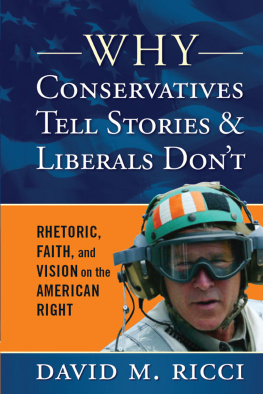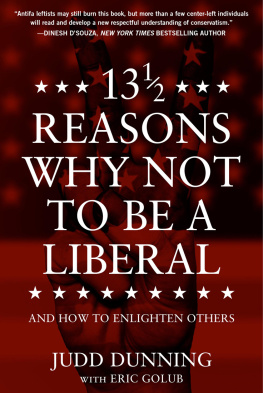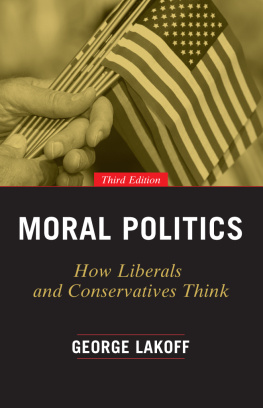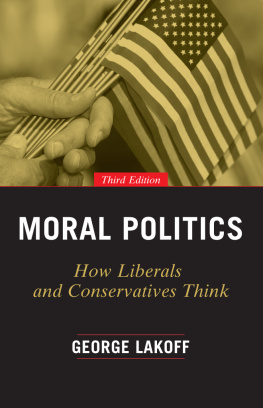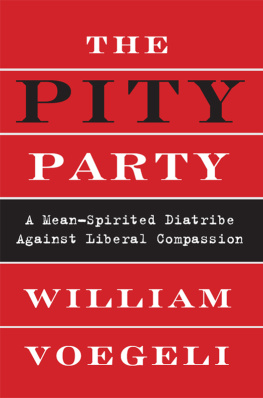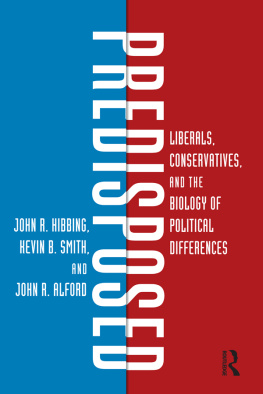WHY CONSERVATIVES TELL STORIES AND LIBERALS DONT
Parts of political stories may be told in images (for example, via television) rather than in words (for example, via books and magazines). Thus on May 1, 2003, President Bush, wearing a fighter pilots flight suit, flew to the USS Abraham Lincoln, a nuclear aircraft carrier sailing in Pacific waters near San Diego. While dressed as a modern warriorcomplete with helmet and gogglesthe president was photographed on board with some of the ships crew members, who also wore combat clothing. Later, and dressed as a civilian, the president appeared in television reports while (1) announcing from the Lincolns flight deck, (2) against the backdrop of a sign reading Mission Accomplished, that (3) major military operations in Iraq have ended. In these circumstances, George W. Bush must have looked, to some viewers, like a seasoned and energetic commander, presiding over courageous and popular armed forces, confidently and reliably leading the nation to victory over terrorism. That Mr. Bush had learned to fly while enrolled in a National Guard unit designed to keep him, and other privileged young men, out of combat during the Vietnam War, was not part of the projected image and perhaps not known to, or recalled by, the same viewers.
First published 2011 by Paradigm Publishers
Published 2016 by Routledge
2 Park Square, Milton Park, Abingdon, Oxon OX14 4RN
711 Third Avenue, New York, NY 10017, USA
Routledge is an imprint of the Taylor & Francis Group, an informa business
Copyright 2011 , Taylor & Francis.
All rights reserved. No part of this book may be reprinted or reproduced or utilised in any form or by any electronic, mechanical, or other means, now known or hereafter invented, including photocopying and recording, or in any information storage or retrieval system, without permission in writing from the publishers.
Notice:
Product or corporate names may be trademarks or registered trademarks, and are used only for identification and explanation without intent to infringe.
Library of Congress Cataloging-in-Publication Data
Ricci, David M.
Why conservatives tell stories and liberals dont : rhetoric, faith, and stories on the American right / David M. Ricci.
p. cm.
Includes bibliographical references and index.
ISBN 978-1-59451-873-7 (hardcover : alk. paper) ISBN 978-1-59451-874-4 (pbk.: alk. paper)
1. ConservatismUnited States. 2. ConservativesUnited StatesLanguage. 3. StorytellingPolitical aspectsUnited States. 4. RhetoricPolitical aspectsUnited States. I. Title.
JC573.2.U6R53 2010
320.520973dc22
2010015819
Designed and Typeset by Straight Creek Bookmakers.
ISBN 13 : 978-1-59451-873-7 (hbk)
ISBN 13 : 978-1-59451-874-4 (pbk)
News reports since the 2008 election have centered, for the most part, so spectacularly on President Barack Obama that some readers may have difficulty remembering that between 1980 and 2004, conservatives captured the presidency five times, controlled one or both houses of Congress repeatedly, scaled back or canceled signature programs of the New Deal and the Great Society, appointed a series of right-leaning judges to the Supreme Court, and, in February 2003, propelled the nation into a war in Iraq that has taken tens of thousands of lives and may cost $3 trillion before it is over.
In 2006 and 2008, right-wing candidates slipped electorally. All things considered, though, it is clear that in recent decades, and despite receiving less media attention today than they did until virtually yesterday, people animated by conservative ideas have notably influenced public life in America. Historically, then, conservatives have been strikingly successful, in a project fashioned by men and women (1) who are thoroughly committed to their principles, (2) who are regrouping across the landmost obviously now at Tea Partiesand (3) who will surely, as they have done after setbacks in the past, reassert themselves culturally, economically, and politically.
The Vision Thing
Now, what interests me most about this performance is not the maneuvering that accompanied itsay, the Republican Partys southern strategy the conservative George W. Bush, barely elected in 2000, was elected again. With so many potential strikes against him, was not the presidents victory a triumph for whatever inspirational messagethe vision thing, his father had called itthe candidate managed to project?
Under the circumstances, the 2004 election can be interpreted by saying that Bush II won by staying on script. But in that case, the conservative script must be very powerful. Indeed, it was so powerful in 2008 that when John McCain and Sarah Palin followed it, more or less, their poll ratings, even while the war dragged on, were similar to those of Barack Obama and Joseph Biden until Lehman Brothers Holdings Inc. collapsed on September 15 of that year and a looming economic disaster seized the nations attention less than two months before election day.
Conservative Talk
So let us consider in this book the conservative script. Here is the special discourse within which many conservative politicians, journalists, and activists go about their work and sometimes win elections. Here are the terms that project right-wing principles and priorities, together adding up to a vision about how the country got to where it is, what it is doing now, and where it should go from here.
Other people will write about conservative chronologies, personalities, fund raising, election campaigns, organizational networks, lobbying, legislative agendas, judicial strategies, and morethat is, about various aspects of political ups and downs on the right stretching from Barry M. Goldwater to George W. Bush and beyond. Some have already done so. I will write, instead, about a verbal dimension of those events, to show how right-wing propositions link up and hold together to constitute a powerful force in Americas political conversation today.
Accordingly, I will not explain in detail what conservatives think about, say, poverty, with examples from writings by Charles Murray, George Gilder, Marvin Olasky, Newt Gingrich, Irving Kristol, Jerry Falwell, William Buckley Jr., Glenn Beck, and so forth. The same is true for other interesting matters such as feminism, the origin of life, supply-side economics, immigration, and constitutional intent. Rather, I will show, with reference to such mattersbut also to welfare, race relations, abortion, family values, the optimal level of taxation, and other important topicsthat when conservatives talk about social and economic situations, they tend to deploy particular arguments, sometimes effective, that show up repeatedly in what they say about a wide range of public issues.
we will see that conservatives in public life do not project such a philosophy. They have, nevertheless, created a matrix of talk that works very well compared to liberal arguments that often do not mesh effectively. After showing this to be so, I will remark later on why, when political polemics are conducted, liberalism has in many recent years performed poorly.

